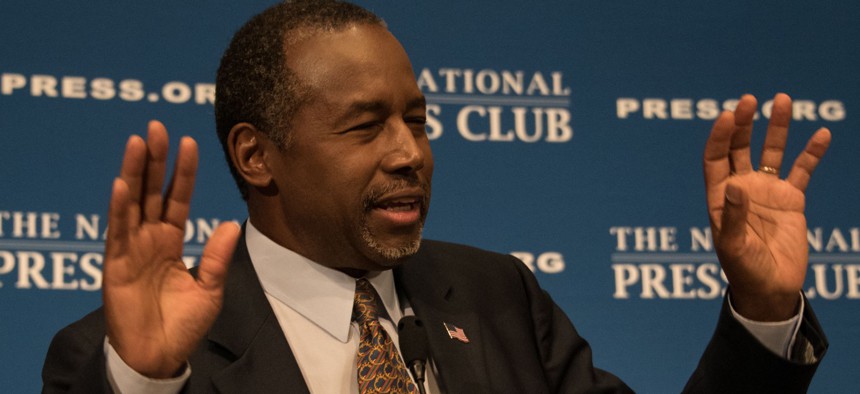Congressional Appropriators Show Little Enthusiasm for Trump’s CDBG Cuts

U.S. Housing and Urban Development Secretary Ben Carson Shutterstock
As HUD Secretary Ben Carson defends the president’s budget ax on Capitol Hill, there’s strong bipartisan support for the Community Development Block Grant program.
WASHINGTON — The Trump administration’s proposal to eliminate billions of dollars in grant funding that flows from the U.S. Department of Housing and Urban Development to state and local governments is getting a cold reception on Capitol Hill.
Under the budget plan for fiscal year 2018 that President Trump submitted to Congress last month, funding would be eliminated for the Community Development Block Grant Program, commonly referred to as CDBG, and the HOME Investment Partnerships Program.
Housing and Urban Development Secretary Ben Carson defended the cuts as he testified on Thursday about the president’s spending proposal before a House Appropriations subcommittee that oversees transportation, housing and urban development.
“Over the course of time there has been significant mission creep,” Carson said of CDBG in response to a question about the program.
He went on to say that only about 25 percent of CDBG dollars go toward housing. “Within the budgetary constraints that we have, what is critical?” the secretary said. “We have to prioritize.”
But, for key lawmakers on the Appropriations Committee, CDBG and HOME appear to be priorities.
“It’s fair to say that there is very strong support, bipartisan support, for those programs,” U.S. Rep. Mario Diaz-Balart, a Florida Republican who chairs the Transportation, Housing and Urban Development subcommittee, told Route Fifty after the hearing where Carson testified.
He suggested that this support extends beyond the subcommittee, to the full Appropriations Committee and the House.
“We’re going to continue to work with the administration, but there are some areas where we have obviously large disagreements, you’ve mentioned two of those,” Diaz-Balart added, referring to CDBG and HOME.
U.S. Rep. Rodney Frelinghuysen, the New Jersey Republican who chairs the full House Appropriations Committee, told Carson during the hearing that he was “concerned” about the fate of the CDBG program and noted that it has enjoyed bipartisan support for decades.
On Wednesday, Carson provided testimony to a Senate appropriations subcommittee, which is chaired by U.S. Sen. Susan Collins, a Maine Republican. According to a written copy of her opening statement at the hearing, Collins described CDBG and HOME favorably and said she was “deeply troubled” by some of the proposals in Trump’s budget request.
CDBG funding is known for its flexibility. Local governments use the money to support a range of projects and programs, such as rehabbing housing, upgrading sewers, improving parks and providing services that assist the homeless and victims of domestic violence.
The HOME program provides states and localities with grants meant to support affordable housing. The money goes toward activities like buying and fixing-up housing and offering rental assistance to low-income Americans.
Spending legislation for the current fiscal year that Congress approved last month, and that President Trump signed, includes about $3 billion for CDBG and nearly $1 billion for HOME.
The president’s budget plan for the upcoming 2018 budget cycle, which begins Oct. 1, would lower the Department of Housing and Urban Development’s base funding level by about $6.2 billion to $40.7 billion, slashing a variety of the agency’s programs to achieve those savings. Funding is zeroed-out for both CDBG and HOME.
Trump’s proposal calls for deep cuts to many other domestic spending programs as well, along with a $54 billion increase in defense spending. Congressional lawmakers will decide in the weeks and months ahead to what extent they will accept or reject the president’s proposals.
At one point during Thursday’s hearing, Carson was asked whether an infrastructure package the White House is working on might somehow help to make up for the cuts the Trump administration has proposed for community development and affordable housing programs.
“Certainly we have been advocating for housing to be included in the infrastructure bill,” Carson replied. “And things do seem to be moving in that direction. But obviously I can’t comment on that because it hasn’t been formulated yet.”
His response mirrored comments that White House budget chief Mick Mulvaney made earlier this year, indicating that the administration might seek to shift federal housing dollars toward the president’s infrastructure initiative.
As of last month, over 350 mayors from all 50 states, the District of Columbia and Puerto Rico, had signed letters sent to congressional leaders, voicing support for the Community Development Block Grant Program, according to the U.S. Conference of Mayors.
U.S. Rep. David Price, of North Carolina, who is the top Democrat on the House Appropriations subcommittee on Transportation, Housing and Urban Development, said he and his colleagues had “heard from hundreds of local elected officials and housing practitioners” who have said CDBG and HOME play a critical role addressing affordable housing shortages and other needs.
“This budget request says that state and local governments should pick up the slack,” Price said. “But how? How? It’s incomprehensible, it’s unacceptable.”
Bill Lucia is a Senior Reporter for Government Executive’s Route Fifty and is based in Washington, D.C.
NEXT STORY: Here’s Where Children Rely Most on Medicaid






